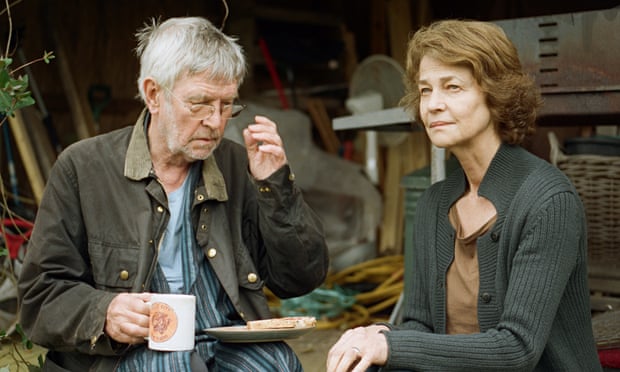 Show captionMark Kermode's film of the week
Show captionMark Kermode's film of the week45 Years review – a very stylish marriage
Tom Courtenay and Charlotte Rampling are at the top of their game in this compelling drama of lost love and missed opportunity
Mark Kermode, Observer film critic
@KermodeMovie
Sun 30 Aug 2015
Superbly nuanced performances from Charlotte Rampling and Tom Courtenay and exquisite direction by Andrew Haigh, who also co-wrote the film, turn an apparently everyday story of a marriage in quiet crisis into something rather extraordinary. A subtle examination of the persistence of the past and the fragile (in)stability of the present, this is a portrait of a rock-solid relationship facing a fissure that cuts to its very core in the runup to the titular wedding anniversary.
The source material is David Constantine’s enigmatic short story In Another Country, in which an ageing married man receives a letter telling him that the body of his previous girlfriend has been found, perfectly preserved in the ice of the Alps where she fell 50 years ago. This news gets a chilly reception from his wife, who is alarmed by the frozen spectre of a former love. “Into the little room came a rush of ghosts,” writes Constantine, the vision of “my Katya”, who has aged not a day since her death, creating an icy fracture as tangible as that into which the poor soul tripped and fell all those years ago.Charlotte Rampling: ‘You can’t fool an audience with lots of bits and pieces. You have to lead them somewhere’
From the kaleidoscopic shards of this slender story, Haigh, who describes 45 Years as a “companion piece” to 2011’s affectionate Weekend, wrings a tale of remarkable complexity, depth and darkness. While accepting that she can hardly resent a relationship that happened before they met, Rampling’s watchful Kate struggles to make sense of her childless marriage in the new knowledge of this perfectly preserved interloper. As for Courtenay’s bamboozled Geoff, the discovery of Katya’s body turns him into a man out of time (“She looks like she did in 1962 and I look like this”), his spirit spiralling back toward distant youth, his memories clearer and more vivid than his foggy-eyed vision of the present.
The dialogue is naturalistic and the Norfolk Broads setting melancholic (its flatness in stark contrast to Geoff’s former Alpine adventures), yet there is something steely that lies beneath – a touch of Michael Haneke’s frost. The days are chaptered like a crime thriller and more than once I was reminded of the secrets and lies of Caché, Geoff furtively slipping into the attic in search of buried mementoes, Kate threatened by photo slides revealing the chasmic depths of her husband’s past. Ironically, it is the honesty with which Geoff answers his wife’s questions (“Would you have married her?”) that gives Kate cause to doubt him. Meanwhile, the diegetic musical choices tell a sinister tale of their own; after describing how he suspected their Alpine guide of flirting with his girlfriend, Geoff leads Kate around the living room to the tune of Stagger Lee, its themes of quarrelling and murder unabated by Lloyd Price’s upbeat treatment. (The Turtles’s Happy Together and the Moody Blues’ Go Now also provide arch romantic commentary.)
Amid the suspicion there is tenderness too, an abortive bash at lovemaking depicted with a frank and gentle quality that speaks volumes about the couple’s shared sexual past. These are characters whose history is alive in every glance and gesture, Haigh and cinematographer Lol Crawley (shooting on 35mm) favouring lengthy two-shots in which either partner may drift in or out of frame, allowing the performances to breathe in unedited takes. There’s no room to hide, and Courtenay and Rampling are at the top of their game throughout, drawing us into their hopes and fears even as we watch them from a distance. Rampling in particular is a symphony of physical cries and whispers, her worried eyes and strained smiles choreographed with breath-taking precision, her face falling as slowly as the melting ice with which Geoff becomes so obsessed.
Like the final shot of The Long Good Friday, which lingers upon Bob Hoskins’s face as he revisits the events that brought him to this sorry pass, 45 Years shows us the past materialising in the expressions of those trapped in the present, staring into an uncertain future. As Geoff and Kate dance to the Platters’ plaintive Smoke Gets in Your Eyes, we see their history laid bare, well-rehearsed moves made unfamiliar, embraces separated by distance – physical and temporal. Viewers will decide for themselves what the film’s parting shot means (another Hanekean trope), but I suspect most will agree about the haunting quality of this deceptively simple and richly disorienting glance into the abyss.
